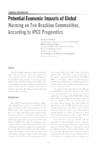Por favor, use este identificador para citar o enlazar este ítem:
http://www.alice.cnptia.embrapa.br/alice/handle/doc/31863Registro completo de metadatos
| Campo DC | Valor | Lengua/Idioma |
|---|---|---|
| dc.contributor.author | ZULLO JÚNIOR, J. | pt_BR |
| dc.contributor.author | PINTO, H. S. | pt_BR |
| dc.contributor.author | ASSAD, E. D. | pt_BR |
| dc.contributor.author | EVANGELISTA, S. R. M. | pt_BR |
| dc.date.accessioned | 2017-03-31T23:44:50Z | - |
| dc.date.available | 2017-03-31T23:44:50Z | - |
| dc.date.created | 2009-03-30 | pt_BR |
| dc.date.issued | 2008 | pt_BR |
| dc.identifier.citation | Terrae, Campinas, v. 3, n. 1, p. 28-39, 2008. | pt_BR |
| dc.identifier.uri | http://www.alice.cnptia.embrapa.br/alice/handle/doc/31863 | pt_BR |
| dc.description | The effects of global warning on soybeans and arabica coffee at the end of 21st century were assessed based on the prognostics of IPCC and on the methodology of the agricultural zoning program. The potential economic impact on the production of soybeans and arabica coffee can be significant in the regions analyzed showing the immediate need for political and technical actions in order to minimize unfavorable effects that can affect the Brazilian economy in the next decades. | pt_BR |
| dc.language.iso | eng | eng |
| dc.rights | openAccess | eng |
| dc.title | Potential economic impacts of global warming on two brazilian commodities, according to IPCC prognostics. | pt_BR |
| dc.type | Artigo de periódico | pt_BR |
| dc.date.updated | 2017-03-31T23:44:50Z | pt_BR |
| dc.subject.thesagro | Agricultura | pt_BR |
| dc.subject.thesagro | Clima | pt_BR |
| dc.subject.thesagro | Soja | pt_BR |
| dc.subject.thesagro | Café | pt_BR |
| dc.subject.thesagro | Impacto Econômico | pt_BR |
| riaa.ainfo.id | 31863 | pt_BR |
| riaa.ainfo.lastupdate | 2017-03-31 | pt_BR |
| dc.contributor.institution | JURANDIR ZULLO JÚNIOR, UNICAMP; HILTON SILVEIRA PINTO, UNICAMP; EDUARDO DELGADO ASSAD, CNPTIA; SILVIO ROBERTO MEDEIROS EVANGELISTA, CNPTIA. | pt_BR |
| Aparece en las colecciones: | Artigo em periódico indexado (CNPTIA)  | |
Ficheros en este ítem:
| Fichero | Descripción | Tamaño | Formato | |
|---|---|---|---|---|
| APPotentialZulloetal2008.pdf | 1,55 MB | Adobe PDF |  Visualizar/Abrir |









